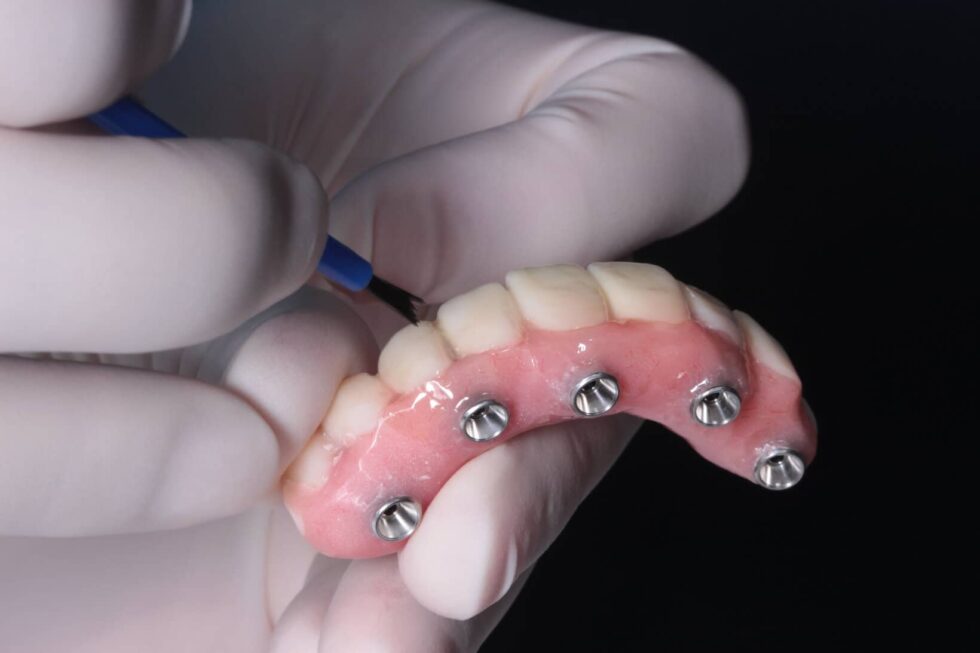Are Dental Implants safe?
Factors Affecting Dental Implant Safety
- Quality of the dental implant material
- Experience and skill of the dental surgeon
- Patient’s overall health and oral hygiene
- Proper aftercare and follow-up appointments
Dental Implant Surgery Success Rate
Overall, dental implant surgery boasts a high success rate, with studies showing a range of 90-98% success. Patients can further improve their chances of success by diligently practising good oral hygiene, attending regular dental check-ups, and following their dentist’s recommendations.
The Risks Of Dental Implants
- Infection at the implant site
- Injury to surrounding teeth or blood vessels
- Nerve damage leading to pain or numbness
- Sinus problems (when placed in the upper jaw)
Is It Possible For A Dental Implant To Be Rejected?
What Causes Implants To Fail?
Here, we discuss some of the most common factors that may lead to implant failure:
Inadequate Bone Support
If the jawbone lacks volume or density, it may not support the implant effectively, leading to implant failure. Bone grafting, a procedure aiming to restore jawbone density, can address this issue before implant placement.
Peri-implantitis or Peri-implant Infection
Poor Surgical Techniques
Implant Overloading
Failed Osseointegration
Medical Conditions
What Is The Failure Rate Of Dental Implants?
Failure Rate Variability
Factors Affecting Failure Rates
- Patient’s oral hygiene habits
- Implant location
- Quality of surgical technique
- Bone density
- Oral health status
- Individual differences in healing ability
Minimising Failure Rates
To minimise dental implant failure rates, we at Glenferrie Dental recommend the following:
- Choose an experienced and reputable dental professional.
- Discuss your medical and dental history with your dentist.
- Follow your dentist’s guidance on post-operative care.
- Maintain good oral hygiene habits.
- Schedule regular dental check-ups and cleanings at Glenferrie Dental.
Resources for Further Reading
For more in-depth information on dental implant failure, its causes, and prevention, consider the following resources:
Dental Implant Success And General Health
How Does General Health Influence Implant Success?
- Chronic conditions: Diabetes, osteoporosis, or autoimmune disorders can slow healing. Patients must manage these conditions before implant treatment.
- Tobacco use: Smoking impairs blood circulation, and tissue regeneration, and increases peri-implantitis risk. Patients should quit or reduce smoking before surgery and during healing.
- Poor oral hygiene: Adequate oral hygiene is vital for implant health. Proper brushing, flossing, and regular dental checkups and cleanings are crucial.
- Medications: Some medications, such as immunosuppressants, anticoagulants, and bisphosphonates, can affect implant integration and healing. Dentists should be informed of all medications taken and may suggest alternatives or specialist consultations.

What Is The Risk Of Infection In Dental Implants?
- Risk factors: Patients with periodontal disease, poor oral hygiene, or smoking habits are more prone to infections. Patients should disclose their medical history and lifestyle habits to their dentist.
- Signs of infection: Early detection of infection symptoms, such as redness, swelling, pain, pus discharge, or persistent bleeding, is crucial. Contact your dentist for evaluation and treatment if an infection is suspected.
Preventive Measures To Minimise The Risk Of Infection
Our team recommends the following steps to ensure a successful outcome:
- Maintaining good oral hygiene through regular brushing, flossing, and using antimicrobial mouthwash.
- Avoiding smoking and limiting alcohol consumption during the healing process.
- Following the dentist’s post-operative care instructions carefully.
- Ensuring that you have a healthy immune system by eating a balanced diet, getting enough sleep, and exercising regularly.
- Regular dental checkups and professional dental cleanings to monitor the condition of the implant and surrounding tissues.
By addressing potential health issues and practising good oral hygiene, patients can greatly increase the chances of dental implant success and avoid complications such as infection.
If you are currently considering dental implants as a treatment option, consult with your dentist to discuss any potential risks and develop a customised treatment plan tailored to your needs.
What Are The Most Common Complications After Dental Implant Surgery?
The most common complications after dental implant surgery include:
- Infection: Infections at the implant site are the most common complications after the surgery, which may require antibiotic treatment or other interventions depending on the severity and location.
- Gum recession: The gum tissue around the implant may recede, leading to inflammation and pain. Prompt assessment by a dentist is crucial to prevent implant removal.
- Loose implant: If the implant fails to fuse with the jawbone during the osseointegration process, it may become loose, and the dental surgeon might need to remove or fix the implant.
- Nerve or tissue damage: Placing a dental implant too close to a nerve can cause numbness, tingling, or pain. Immediate attention is required in case of nerve or tissue problems.
These complications can be managed and resolved with appropriate dental care, follow-up, and treatment.
In conclusion, although there are risks associated with dental implant surgery, being well-informed and proactive in prevention can considerably minimise their likelihood and impact.
Open communication between patients and healthcare providers is essential for a seamless postoperative healing process. So contact us today if you wish to learn more about dental implants and the procedure.
By promptly addressing potential complications and adhering to medical professionals’ advice, patients can confidently undergo dental implant procedures, ultimately enjoying a safe and successful recovery.